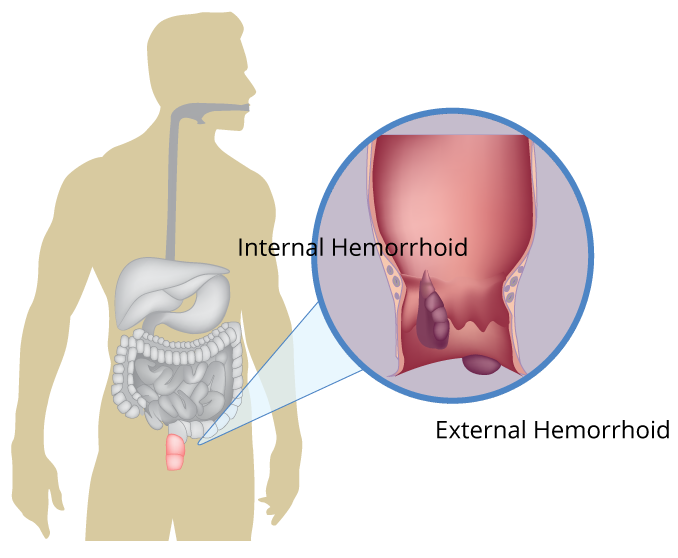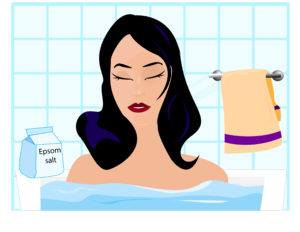Hemorrhoids

Hemorrhoids occur when the blood vessels in the lower part of your rectum and anus become swollen. There are two types
Internal hemorrhoids which occur inside the lining of the rectum and anus
External hemorrhoids, which form under the skin surrounding the anus
Hemorrhoids, also called piles, affect 1 in 20 Americans. At least half of adults over 50 have experienced hemorrhoids. While they do not cause serious health problems, they can become painful. Fortunately, treatment options are readily available.
Symptoms
Symptoms of hemorrhoids include
- Anal itching or pain, especially noticeable while sitting or having a bowel movement
- Rectal bleeding, usually bright red
- Bulging tissue or lumps surrounding anus
- Leakage of stool
Causes
Hemorrhoids may occur because of
- Increased pressure in rectal area due to obesity, frequent sitting or pregnancy
- Straining during bowel movements, or sitting on toilet too long
- Straining while lifting
- Frequent constipation or diarrhea
- Weakening of tissues surrounding anus and rectum due to aging
Diagnosis
Your doctor can diagnose hemorrhoid pain and it’s underlying causes by:
- Taking a medical history
- Performing a physical exam, including a digital exam of the rectum
- Performing other tests, occasionally involving a sigmoidoscopy or colonoscopy
Treatment
Sometimes hemorrhoids will go away on their own. In some cases you can take measures at home to relieve your symptoms.
DIETARY CHANGES One of the best ways to alleviate pain or discomfort due to hemorrhoids is to avoid constipation or hard stools. Sometimes constipation or hard stools can be helped with a few changes in the diet.
- Increase Dietary Fiber Fiber is the part of the fruits, vegetables and grains and legumes that cannot be digested by the human digestive system. Insoluble fiber helps in the bowel by absorbing water and pushing waste through the digestive tract. It is recommended that adults consume 25-35 grams per day. Consciously adding fiber to your diet can not only help your digestion, but provide other health benefits. Click here to learn more about a high fiber diet.
- Increase water intake When you don’t drink enough water, your body tries to draw more water from the bowels, causing stools to become hard and dry. Drinking more water can alleviate constipation by adding more water in the bowel to keep stools soft and easy to pass.
MEDICATIONS When dietary fiber is not sufficient there are several alternatives that your physician may suggest.
- Fiber supplements Bulk forming agents work by soaking up the fluid in your gut, making your stool bulkier and easier to pass. While they may cause bloating and abdominal discomfort, drinking plenty of fluid can ease those symptoms. Users should start with smaller doses, increasing until regularly bowel movements occur. Common product names include:
- Benefiber—wheat dextrin
- Metamucil, Konsul, Serutan—psyllium seed
- FiberCon—polycarbophil
- Citrucel—methylcullulose
- Stool softeners work by drawing water into the stool, making them softer and easier to pass. These products are especially helpful for patients after childbirth or surgery and others who shouldn’t strain to have a bowel movement. Common brands include:
- Colace
- Docusate
- Surfak Stool Softener
- Phillips Stool Softener
- Laxatives Osmotic agents are laxatives that increase the amount of water retained within the colon, resulting in a softer stool. While they are available over the counter, older adults and those with heart or kidney problems should limit the use of these products, as they can cause dehydration or mineral imbalances. Common brands include:
- Miralax
- Glycolax
- Milk of Magnesia
- Topical Medications & treatments To alleviate the symptoms of hemorrhoids, you may want to try
- Sitz Baths Warm sitz baths involve a lukewarm bath in the tub and can provide relief from hemorrhoid pain. Pharmacies offer another option of a sitz bath kit, which are inexpensive portable basins that fit over a toilet seat for those who prefer not to fill the bathtub for each treatment.

To take a sitz bath in your home bathtub:
- Fill a bathtub with 3 to 4 inches of warm water without bubble bath or soap.
- Add up to 2 cups of Epsom salts, if desired
- Soak three times a day for 15-20 minutes, ensuring that your bottom area is covered.
- Afterward, gently pat dry the area using a soft towel.
- Ointments, Creams and Suppositories A variety of ointments, creams and suppositories are available over-the-counter to help with the discomfort and itching associated with hemorrhoids. Some contain phenylephrine or similar medicines which work by shrinking the blood vessels in in the rectal area. Others contain hydrocortisone, a steroid that works by decreasing inflammation and shrinking the swollen areas. Finally, some contain lidocaine or pramoxine, which are local anesthetic that provide pain relief. Some medications contain a mixture of these preparations. Common brands are
- Preparation H (various formula available that contain one or more of the phenylephrine, hydrocortisone and lidocaine medications)
- Anusol-HC, ProtoCare HC Protosol-HC (Hydrocortisone)
- HemAway (phenylephrine and lidocaine)
- Recticare (lidocaine)
- Other topical options You may find relief from the use of pretreated wipes or witch hazel. Witch hazel is an astringent that can be obtained inexpensively and is known to help with relieving swelling and discomfort of hemorrhoids.
- Medical Intervention If home treatment fails to alleviate your symptoms, medical intervention may be necessary.
- Rubber band ligation is an in-office procedure that involves placement of a rubber band ring around the base of an internal hemorrhoid. With a restricted the blood supply, the hemorrhoids shrinks and eventually drops off. Our office offers the CRH O’Regan System® a simple in-office hemorrhoid banding treatment. To find out more about Hemorrhoid Banding, click here.
- Injection sclerotheraphy—is an in-office procedure in which a hardening chemical is injected into hemorrhoid to make it clot
Non surgical procedures are successful in more than 80% of patients suffering with hemorrhoids. For those who do not respond well, you doctor may recommend a surgical procedure.
If you are bothered by hemorrhoids, our office can help. Call (706) 868-0104 for more information.
The content on our website is for informational purposes only, and is not intended to diagnose or treat any medical conditions. Always seek the advice of your physician with any questions you may have regarding your health.
